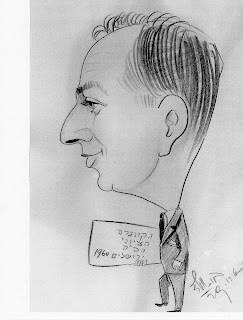 |
| Caricature of Moshe at 1960 World Zionist Congress |
I learned a thing or two from having my article published in The Forward on the life and passing of Moshe Kagan, our elder statesman and longtime friend. One thing was that I had to convince The Forward to allot space for mentioning his actual work with the World Zionist Organization and the American Zionist Movement. As the news editor was undoubtedly correct in saying, Moshe’s organizational associations in this realm are indeed arcane to most readers of The Forward, and most Jews in general (even to most Israelis).
Part of what is important for me to say about Moshe (but didn’t in my article) is that he believed in the Zionist movement as a democratic forum for the Jewish people, rather than the plutocracy that so much of the Jewish organizational world has become. He was bitterly disappointed when a majority of the constituent groups of the American Zionist Movement decided to appoint delegates to the most recent World Zionist Congress in 2010, without the benefit of elections (arguing they were too expensive). For understandable promotional reasons, both my article and The Forward emphasized the human interest story of Moshe’s 50-year friendship with Ariel Sharon. This is the totality of what was finally published on his Zionist activism, anchored in his being…
…. a founder of Americans for Progressive Israel, the American affiliate of Mapam, which he also served as president for a time. In 1997, paralleling developments in Israel, API merged with another group [the Education Fund for Israeli Civil Rights and Peace] to form Meretz USA (now Partners for Progressive Israel).
For many years, he served on the Zionist General Council [the Va’ad HaPoel], which directs the World Zionist Organization between the quadrennial meetings of the World Zionist Congress (which he also attended). What most exemplified his reputation for fairness and integrity were his years as chair of the U.S. elections committee for the American Zionist movement, overseeing the election of delegates to the World Zionist Congress.
Moshe’s secularist convictions informed his Zionism. He believed passionately in the concept of “Jewish peoplehood.” Among his many other organizational involvements were the World Jewish Congress, the Board of Governors of the Jewish Agency for Israel and the Jewish Labor Committee. In all these venues, he strove to advance his twin commitments to secular Jewish identity and social justice. …
I should have mentioned his commitment to democracy. Unfortunately, I did have to leave out a number of his other organizational involvements, including Moreshet and the Givat Haviva Educational Foundation, to which he felt very attached. And I wish to make more clear than I did in the article, that I am indebted to Doug Chandler for his 2006 interview with Moshe, which formed the basis for his article in Israel Horizons magazine and for a profile Doug wrote when we honored Moshe in 2009; this interview yielded much by way of detail on his life, including most of what I wrote regarding his relationship with Ariel Sharon.






Leave A Comment